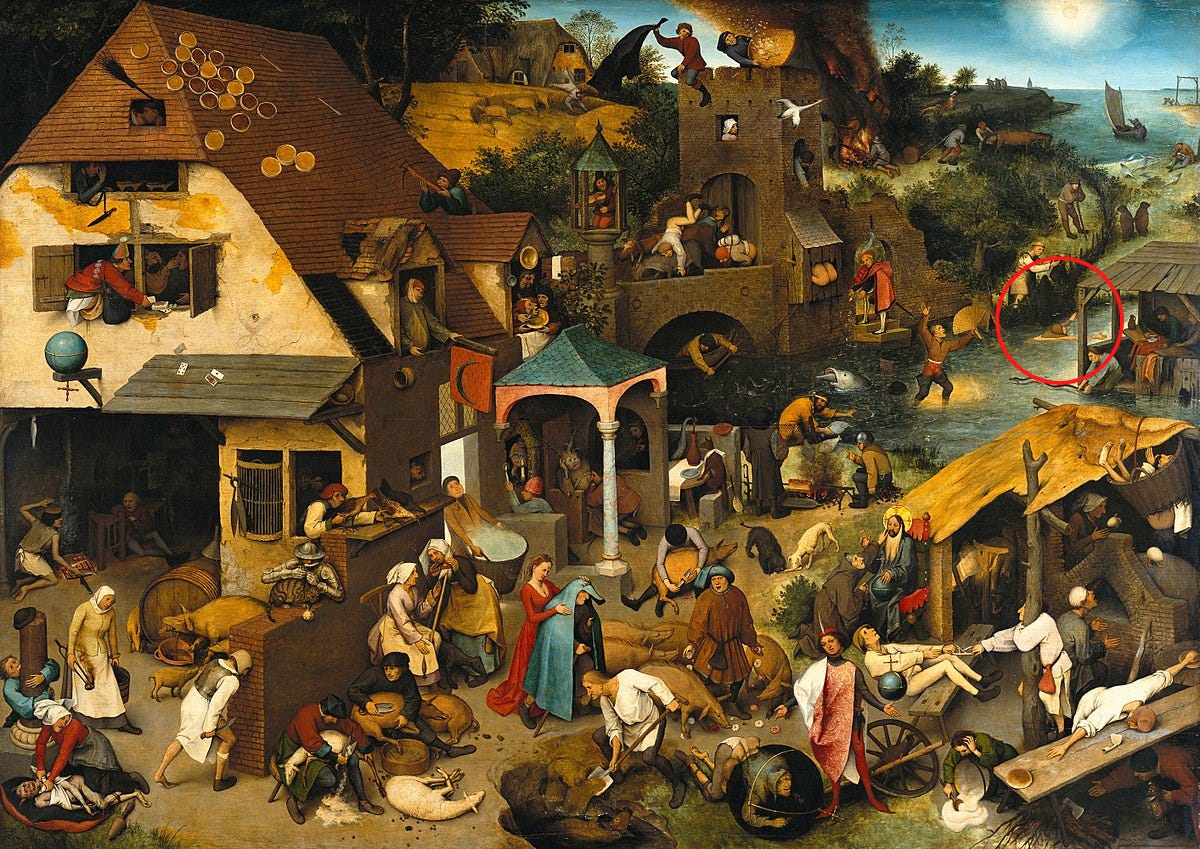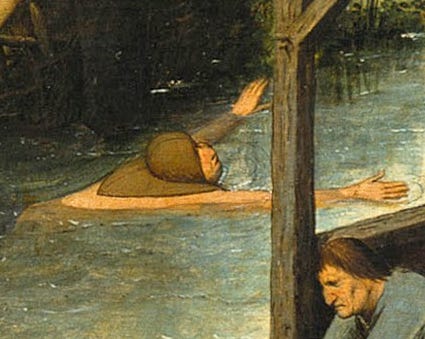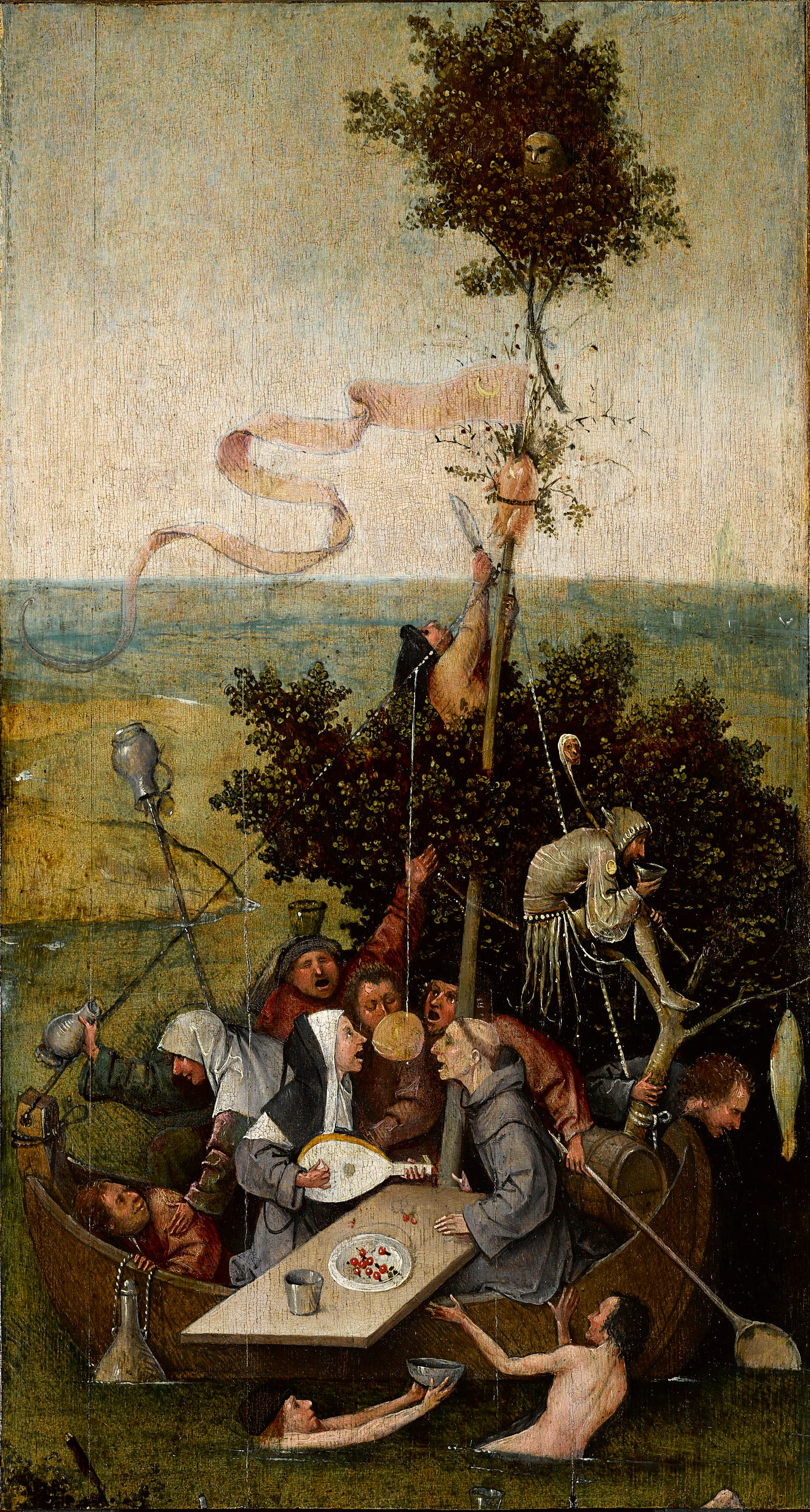Tegen de stroom is het kwaad zwemmen
It is hard to swim upstream
In Bruegel’s Proverbs, one of the proverbs depicted is “tegen de stroom is het kwaad zwemmen.” Translated, “it is hard to swim upstream.” A particularly common saying, which means to say that it is hard to go against common opinion. It is hard to have one’s thoughts find influence, when they are opposed to what is commonly held as true. But why? The proverb can help us.
When we say that it is hard to go against common opinion, we could mean that right now it is hard, because this specific thought does not correspond with this opinion being held as true. We thus mean to say, that if circumstances were different, perhaps when the revolution arrives, or when the truth is out, it will cease being hard. It is circumstantial that it is hard to swim upstream. But if the stream were to calm down, or change directions, the difficulties would subside. But this is precisely an impossibility, a stream cannot ‘just’ change its direction. By using the metaphor of the stream, the proverb means to tell us that it is categorically hard to swim upstream. It is not just that now, in this terribly hard time, in which we feel so alone with our thoughts, it is hard to swim upstream. No, it is a universal characteristic of life and thought, that thoughts that don’t correspond with common opinion have a hard time finding influence. This is the case, this has always been the case, and it will always be the case.
Proverbs seek to display eternal truths about humanity, not just states of affair. It is the same in all great visual art. For example, in Bosch’s painting The Conjurer, we are not merely shown a certain instance of deception. Rather, we are shown a ‘dynamic’ of how deception reveals itself in all times, as an essential part of life. (For more on Bosch’s Conjurer, see my text ‘A Dynamic of Deception’:
In our previous instalment on proverbs, we learned that ‘the Devil invented questioning.’ But, the Devil didn’t just invent questioning in some distant past long gone. No, the Devil invented questioning, and he will keep inventing questioning for evermore, whenever we let him. Failing to grasp this time-less and a-historical character of proverbs, is failing to understand them at all.
It is hard to swim upstream, always was, always will be. But why? In Aristotle’s Topics, an enlightening discussion of doxa (opinion) is given. When discussing deduction, “an argument in which, certain things being laid down, something other than these necessarily comes about through them”(100a20), Aristotle makes a distinction between two types of deduction; dialectical deduction, and demonstration. We speak of a demonstration when the premises from which the deduction starts, are true and primitive. What is true and primitive? Things which are “convincing on the strength not of anything else but of themselves.”(100a30) We can think about the first principles of mathematics or logic. A dialectical deduction, on the other hand, starts not from principles true in and by themselves, but from reputable opinions. These are opinions “which are accepted by everyone or by the majority of the wise.”(100b20) These accepted and trust-worthy opinions are endoxa. Endoxa are commonly held opinions, of society, or of trusted authorities such as poets or philosophers. These endoxa, although they cannot attain the degree of truth that purely reasonable premises have, can still serve as a trusted ground for reasoning, because they have stood the test of time.
It is important to note what ‘dialectics’ is. In a demonstration, we start with primitive truths, from which we then derive even more truths. With dialectics, however, we start with problems, for which we then proceed to find a solution. We start with a commonly held opinion, which we then question to find out if it is really so, and if so, how it is. We make a problem out of an opinion. “It is said that all things are moving, but is this really so?”, or, “It is said that motion does not exist, but is this really so?”. Thus, with dialectics, we problematize commonly held opinions, in order to see if these tried and tested beliefs, can withstand the test of our argument. As we know from many of Plato’s dialogues, such a solution is not always found. Often, the problem is only deepened by the process of dialectics.
Now, this problematization of opinion is necessarily a hard task. He who proceeds to question common opinion, stands before the task of argument. He, whose opinion is questioned, has no need of such argument. He, whose opinion is questioned, already has the strength of the many, and the weight of time, on his side. Otherwise, what is questioned would be no endoxa. He who questions opinion, has to swim. Opinion itself, need only follow the stream.
He who thinks, at first flowing calmly with the stream, has to stop. He has to say “no”, and ask, “why am I even going in this direction? Where does this direction come from?” He has to turn around, and swim towards the origin of the stream, towards the origin of opinion, questioning layer upon layer of belief along the way.
Standing still in the midst of the flowing stream, the thinker is shouted at from all directions, “what are you doing? It is dangerous to stand still, now is not the time to think, you must follow the stream! You will fall over, and you pose a danger to us, preventing us from going where we should!” The thinker refuses to listen, and asks himself, “where does the force of this shouting come from? Why is it dangerous to stand still? I would follow, but only if I know why I should follow, and you can’t tell me why. I stand here still, my head raised high above the water, looking down at this stream. I feel fine, and I do not see how I pose a danger. Where do your threats come from?” He proceeds to swim upstream, to find the origin of opinion. And soon, the stream’s shouting, turns into violence.
Of course, what is now a commonly accepted opinion, once had to be a new thought, thought by a thinker who dared to swim upstream against opinion. What is a common opinion now, is in many respects what remains from this fight against what once was opinion. The opinion is a conclusion, separated from the struggle that consisted in the swimming. When a ‘new’ thought arises, that is contrary to opinion, it has to swim upstream. But when one succeeds, to get up there, at where the stream starts flowing, the thought can be let loose. The thought can flow downstream again, to guide those following the stream, and to serve as an obstacle for those who have begun to swim upstream. He, who swims upstream, has to work for what he thinks. While those following the stream, need only feed off of the work done by a swimmer of old.
An opinion is like a conclusion, cut off from the reasoning that once led to this conclusion. Blindly repeated, without anyone ever asking where it came from. Much like a proverb, an isolated piece of wisdom, cut off from the ‘swimming’ from which it once emerged. In many senses, one should be grateful for common opinions. They help us, like teachers, saving us from the need to think up everything for ourselves. If all of our thoughts were a struggle, were a problematization, we would know nothing, or we would know only madness. Dostoevsky’s Underground Man is a good example of where we would end up. One can also think of the paranoid schizophrenic, for whom even the most insignificant sound, the most insignificant word, the most evident of beliefs, is worthy of problematization.
Not all opinions are equal. The wisdom encapsulated in a proverb, is not the same as the stupidity of unconsidered opinion we encounter on the streets or in the media. Hence, Aristotle makes a distinction between real dialectical deductions, starting from opinions that are reputable, and contentious dialectical deductions, that start from opinions that might seem reputable, but in fact aren’t. Not all doxa, deserves to be called endoxa. Hence, the need for the dialectician, to flesh out which opinions are really to be held in esteem, and which are not. Hence, the hard task of swimming upstream. Not merely to destroy all opinion, but to find those opinions, which are really worth guiding us.
There is a dialectic; thought rising against the stream, and the stream waiting to flood thought with its nonsense. A dialectic infinitely complex; opinion choking thought, and thought fighting opinion. Proper endoxa, carried down in the stream of what is common, being weakened to mere opinion, only saved in their fall by those who swim upstream.







